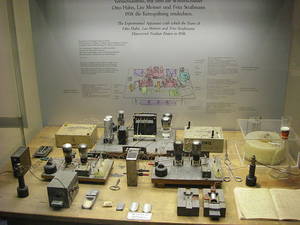This week in science history - the death of Otto Hahn
Interview with
This week in science history saw, in 1968, the death of Otto Hahn, the German chemist who co-discovered nuclear fission, was a courageous opposer of Jewish persecution by the Nazis, a campaigner against the use of nuclear power as a weapon and is considered by many to be the father of nuclear chemistry...
Born in March 1879 in Frankfurt, Hahn showed an interest in chemistry from a young age. Instead of following his father's wishes that he become an architect, he would perform chemistry experiments in the family laundry room as a child, and after leaving school went to study chemistry at the universities of Marburg and Munich. He completed his doctorate in organic chemistry in 1901.
In the early years of the 20th Century, Hahn worked at University College London, where he discovered the radioactive substance radiothorium (later shown to be an isotope of the element thorium). He moved in 1905 to McGill University in Canada to work under Ernest Rutherford, the eminent nuclear physicist. Here he discovered three more radioactive substances - Thorium C, radium D and radioactinium. Returning to Germany, in 1906 Hahn discovered what he called mesotherium 1 - now known as radium 228. This element has become hugely important in the medical world as a cheaper alternative to radium 226, discovered by Pierre and Marie Curie. This discovery led to his first Nobel Prize nomination in 1914, although he did not win.
His research was interrupted by the First World War, where he was conscripted to the research team looking into producing poison gas for use in the trenches. In 1916 he returned to Berlin, and after the war resumed research into radioactive substances with his collaborator and friend Lise Meitner, developing a new field of research known as Applied Radiochemistry.
In 1938 the Nazis carried out the Austrian Anschluss. This made life very difficult for Meitner - she was of Jewish descent and lost her Austrian citizenship. With Otto Hahn's help, she managed to escape to Sweden, and the two remained in contact throughout the Second World War.
 In December of 1938, Hahn and his assistant Fritz Strassman made the discovery that won Hahn the 1944 Nobel Prize for Chemistry - the discovery of nuclear fission. Other scientists such as Enrico Fermi and Ida Noddack had suggested that bombarding heavy nuclei such as uranium might lead to the production of smaller nuclei, and Fermi and his team had already begun experiments in 1934. However, it was Hahn and Strassman who succeeded in producing barium atoms as a product of the fission process. Their results were proven by Lise Meitner's nephew, also in exile in Sweden, in January 1939.
In December of 1938, Hahn and his assistant Fritz Strassman made the discovery that won Hahn the 1944 Nobel Prize for Chemistry - the discovery of nuclear fission. Other scientists such as Enrico Fermi and Ida Noddack had suggested that bombarding heavy nuclei such as uranium might lead to the production of smaller nuclei, and Fermi and his team had already begun experiments in 1934. However, it was Hahn and Strassman who succeeded in producing barium atoms as a product of the fission process. Their results were proven by Lise Meitner's nephew, also in exile in Sweden, in January 1939.
Nuclear fission is a nuclear reaction that involves the breakdown of a large nucleus of an atom such as Uranium 235 or Plutonium 239 into several smaller atomic nuclei, usually initiated by bombarding the nucleus with particles called neutrons. As well as fission products such as Strontium and Xenon, the reaction also releases neutrons, electromagnetic waves and a lot of energy in the process - around 10 million times more energy than a chemical fuel such as gasoline or TNT. It is what powers nuclear power stations and nuclear weapons.
Hahn continued to work on nuclear fission throughout the Second World War, whilst also intervening on behalf of colleagues being persecuted or threatened by the Nazis. Captured by British forces in 1945 as part of Operation Epsilon and transported to Cambridgeshire, Hahn and nine fellow captured German chemists and physicists learned of the American atomic bomb attacks on Hiroshima and Nagasaki. Hahn was so distraught that the process he had discovered had been used to kill so many people that he contemplated suicide. Unlike some of the other German scientists present, he had played no part in Germany's atomic bomb development team.
Throughout the later years of his life he campaigned passionately against the use of nuclear energy as a weapon - suggesting that using the discovery in this way was a crime - and was repeatedly nominated for the Nobel Peace Prize. His integrity and scholarly excellence drew this phrase from the Max Planck Institute as part of his obituary in 1968 - 'His name will be recorded in the history of humanity as the founder of the atomic age...The Max Planck Institute mourns its founder...and a good and much loved human being', and in 1999, he was voted in the German FOCUS magazine to be the third most important scientist of the twentieth century, after Albert Einstein and Max Planck.
- Previous Open source software
- Next Moving Mountains





Comments
how did he DIE
how did he DIE
Add a comment